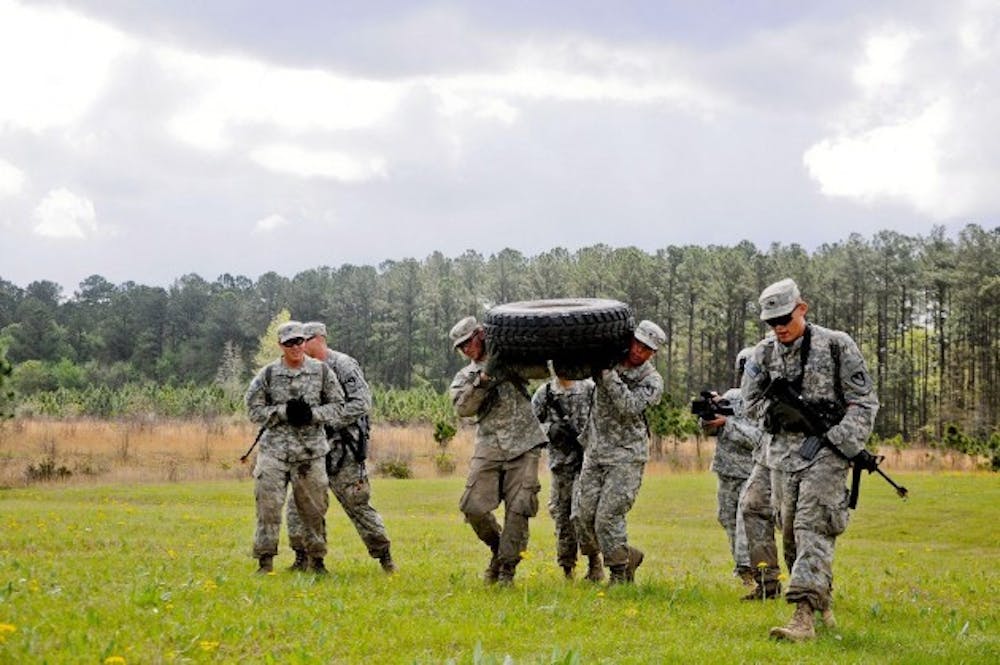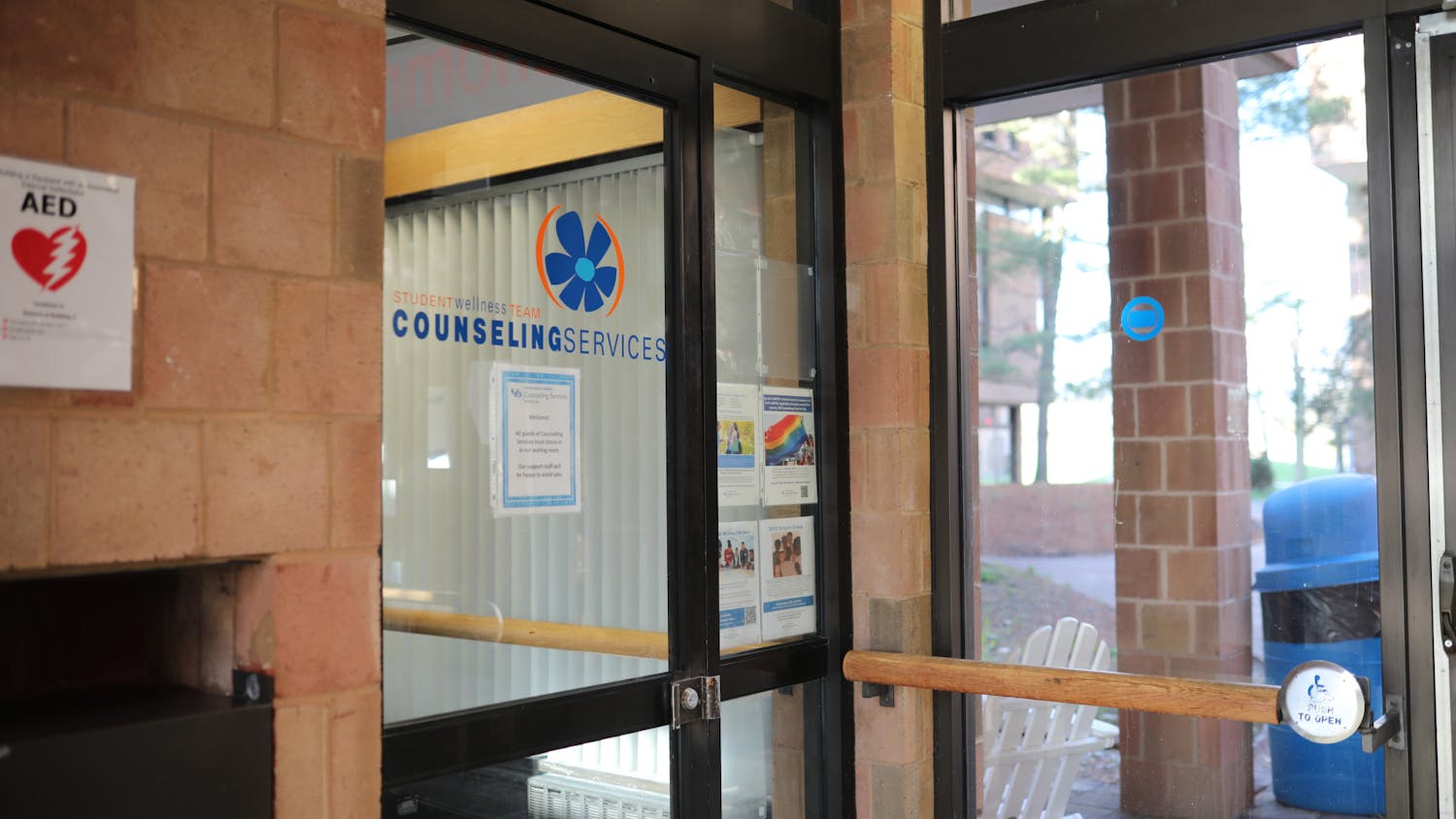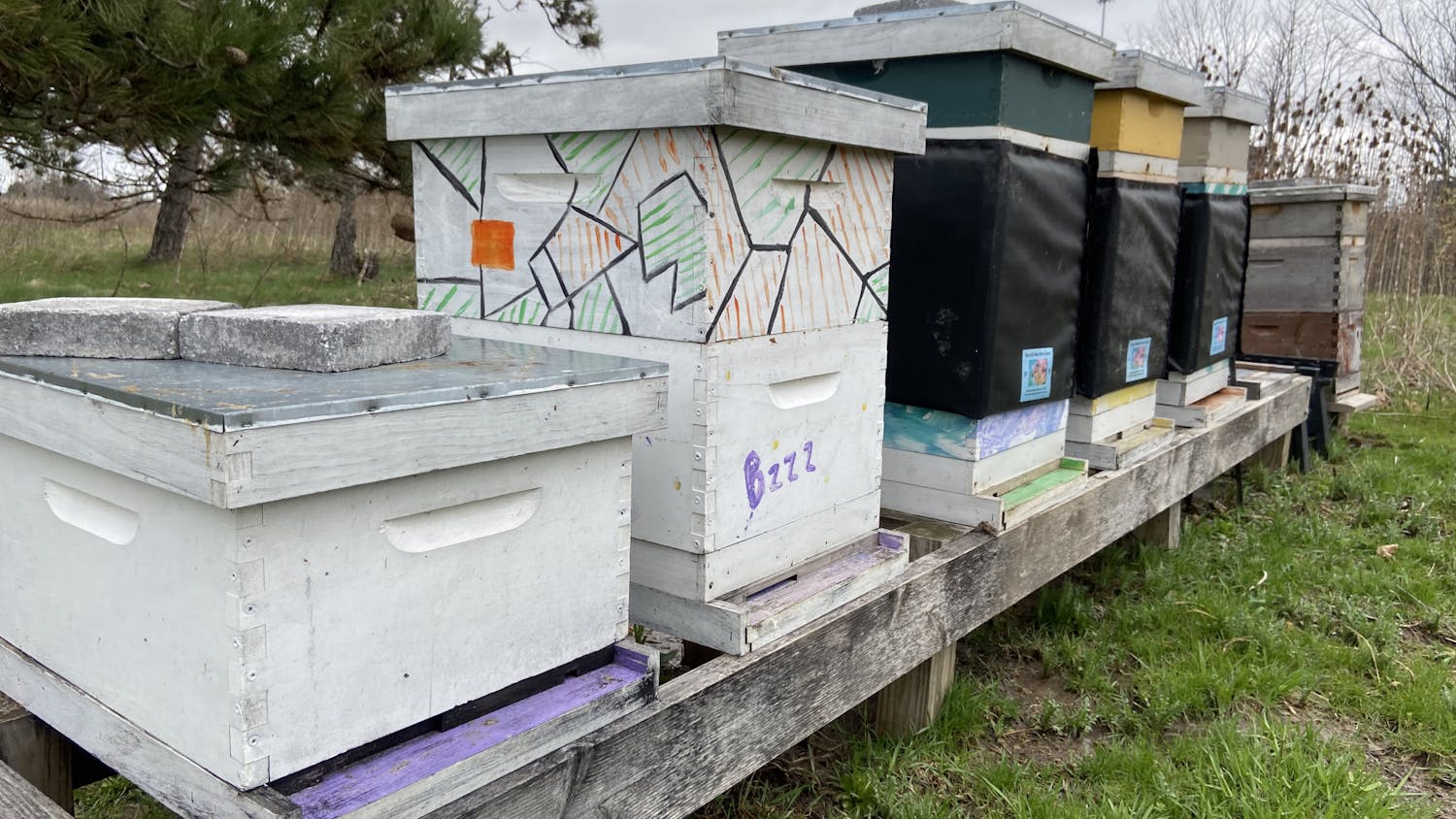Behind the tired eyes of an ROTC cadet at 6 a.m. is the will to fight through pain and fatigue, the motivation to test what's inside, and the desire to serve something beyond oneself. Any cadet on campus can explain what UB's ROTC program is all about: becoming a leader. It's about a duty to each other and their country.
ROTC stands for Reserve Officers' Training Corps. UB's Army ROTC is coordinated in conjunction with Canisius College, the program's host school. Students enrolled in the program - or cadets - are instructed by Army Master Sergeants through several levels of training which include work in the classroom, physical training, and other forms of preparation for active duty.
The program requires young cadets to step out of his or her comfort zone and into roles of leadership before potentially taking on the most difficult - yet satisfying - experience of their lives. It is a program designed to professionally train cadets for active military service as officers in the United States Army.
An officer is expected to hold many responsibilities and guide other soldiers through combat. Responsibility can range from disciplining a fellow soldier - who might be much older than the officer but of a lower rank -to ensuring the safety on an 18-year-old soldier in foreign combat. Above all, an officer's duty is to take care of his or her soldiers.
While some join the program for elective credit, many choose to sign a contract with the Army that sets a course for further service in the military. A small taste of what the program is about is all some cadets need before they know the Army is a perfect fit.
Melissa McKernon is the Cadet Battalion Commander this semester for ROTC. She is at the top of the chain of command for cadets. McKernon is classified as a senior in the program, but she studies at UB as a graduate student preparing to finish her Master's degree in history. ROTC has become a source of great pride and accomplishment for her.
"My senior year of college was drawing to a close and I wasn't sure what I wanted to do next," McKernon said. "I didn't feel like I had contributed to something greater than myself yet. I noticed what ROTC allowed people, like my older brother, to do and saw the opportunity to exercise my full potential."
As the Cadet Battalion Commander she takes on an immense leadership role while trying to balance a friendly relationship with her cadets. She has attended training at Fort Knox in an environment where drill sergeants create high stress situations, as well as a national assessment for ROTC leaders before earning her current rank in the program.
McKernon is responsible for office work and frequent correspondence with instructors (in addition to the usual weekly class and monthly lab that all cadets attend). On occasion, she also leads class. Her favorite part of ROTC has been meeting unique young people with a united goal, who all happen to come from very different backgrounds.
"There's no prescribed personality that you need to have in order to be in ROTC," McKernon said. "You can be a really intense workout person, very shy, very extroverted, and also have a range of interests. You don't need to fit a particular bill; you just need to show up and try your best to meet the Army standard."
Cadets face challenges as members of ROTC. With early-morning training and classes, the work can be difficult to manage with a college student's full schedule. Often, cadets sacrifice a social life in order to successfully complete the program.
As the Army focuses on downsizing, cadets need to present themselves as elite candidates for officer training. They need to show that they have ascended to the pinnacle of physical, academic, and professional standards. In order to meet this standard, they look to their experienced superior officers to instruct them as soldiers and guide them as future leaders.
All instructors in the ROTC program are veterans of foreign wars. As heroes of the U.S., they understand what it takes to push cadets and help them reach their full potential before they are sent to overseas combat.
"Anybody that gets deployed to a foreign war is a role model," McKernon said. "They've put themselves in danger and that's an experience I respect, but even outside of that I see our instructors as my future. They have grown through being Army officers and they balance family, career, and everything else. Now they walk us through how to deal with very intense and difficult situations in preparation for becoming an officer."
Master Sergeant (MSG) Gene B. Bass has been a senior instructor for ROTC since May of 2009.
Bass served 23 and a half years in the Army and took three tours of combat duty between Iraq and Afghanistan. He has held every leadership position that an enlisted soldier can have: Squad Leader, Platoon Sergeant, First Sergeant, and Sergeant Major. At the end of this year he is planning to retire.
"As an ROTC instructor I am a teacher, coach, and mentor to the young men and women who aspire to become the future of Army leadership," Bass said. "The ROTC department is passing on the torch so to speak to the next generation of Army leaders, so it is a very important job. Our country depends on us to prepare them for service."
The class that Bass instructs this semester is a second-year ROTC course entitled "Self and Team Development." In this class, students continue what they have learned from their first year courses about progressing as individuals and then incorporate the fundamentals of teamwork and cohesion as a unit.
ROTC courses are designed for cadets to think "outside the box" for the purpose of handling not only military assignments, but challenges in life as well. Coursework includes time and stress management, personal goal setting, problem solving, working as a team, and basic military skills like map reading, land navigation, and first aid.
For Bass, working with the cadets is the best part of the job.
"They bring out the best in each other and in me," Bass said. "I love knowing that there are young people in this country that still believe in what America stands for - the principles that our forefathers founded this country on. Freedom is not free. Men and women of the Armed Forces have sacrificed a lot to keep our freedom and these cadets have expressed the desire to do the same."
In learning to become officers, cadets develop a very close bond with their instructors. Because they are so close with the cadets, instructors do not demand rigid formalities with Military Customs and Courtesies, but they do demand respect.
Cadets are expected to address instructors with "sir" or "ma'am," and what others might respond to with 'yeah' or 'nope' is always 'yes' or 'no' for cadets. When cadets get too comfortable with their superiors, they are corrected - sometimes loudly.
Due to the closeness of this relationship and the great deal of time spent with cadets, ROTC instructors are able to become part of a student's life in a way that professors normally don't experience with their students.
"You will find that ROTC instructors tend to be very invested in the overall development of a person, whereas professors may not," McKernon said. "ROTC instructors see you so often in high stress situations. They've seen you express a full range of emotions and handle a full range of responsibilities. They have the privilege of seeing so much more of you and understanding your life, which is an insight that most professors would never have."
McKernon is looking forward to the next step of her Army career. She hopes to follow in the footsteps of her instructors. Cadets who finish ROTC are not required to go to basic training and can immediately become commissioned officers at the rank of Second Lieutenant (2LT) after graduation. Contracting with the Army through ROTC normally requires an eight year obligation to either the active or reserve component of the U.S. Army.
After graduation, McKernon will have time to prepare herself before traveling to San Antonio, Texas, for a Basic Officers Leadership Course (BOLC) in the fall. She sees the down time as her last summer vacation for the next six years. In Texas, she will train to become a medical services officer and wait for further assignment. The prospect of an active combat tour is very real to McKernon and she feels prepared to handle that responsibility if she is ordered to serve overseas.
"When I decided to join ROTC we were still in Iraq and we're still in Afghanistan now," McKernon said. "I was basing my decision off of the example of people I knew who had gone through ROTC and had also been deployed to either Iraq or Afghanistan. The idea of being deployed makes me nervous, because I've heard of the things that go on over there. My responsibility is to bring people home safely from that, but I don't shrink from it. That's a responsibility I've taken on and agreed to do because the Army needs me to do it."
McKernon has an older brother who attended Fordham University and completed ROTC before going on to tour in both Iraq and Afghanistan. Her younger brother is currently in ROTC at Fordham.
"My mother has a few more gray hairs as a result of it, but she's very proud of us. We've all had our own reasons to join, but we share the privilege of serving our country," McKernon said.
Whatever their reasons for joining, Army ROTC cadets form a unit on this campus dedicated to a standard of excellence. An Army standard.
Email: features@ubspectrum.com





